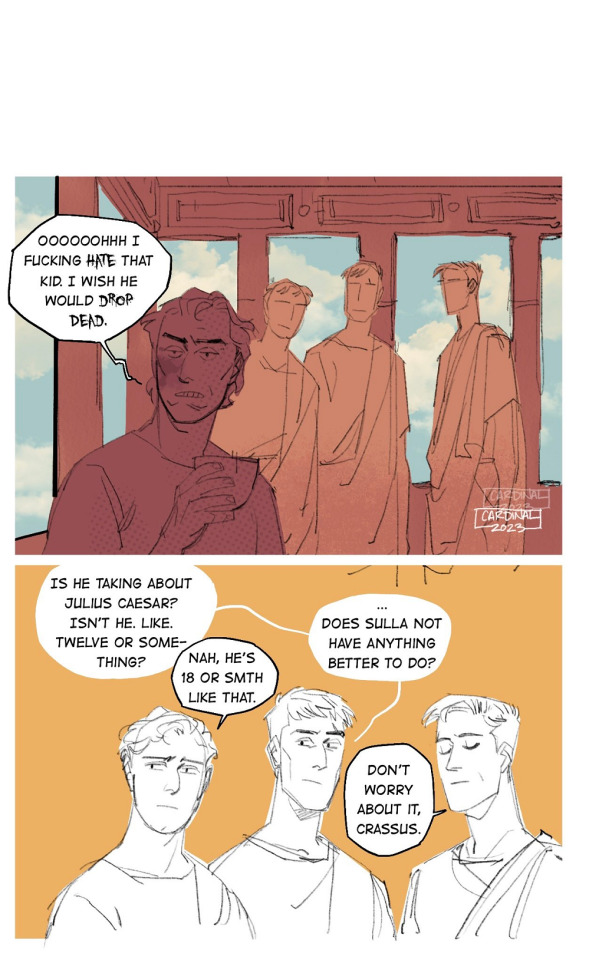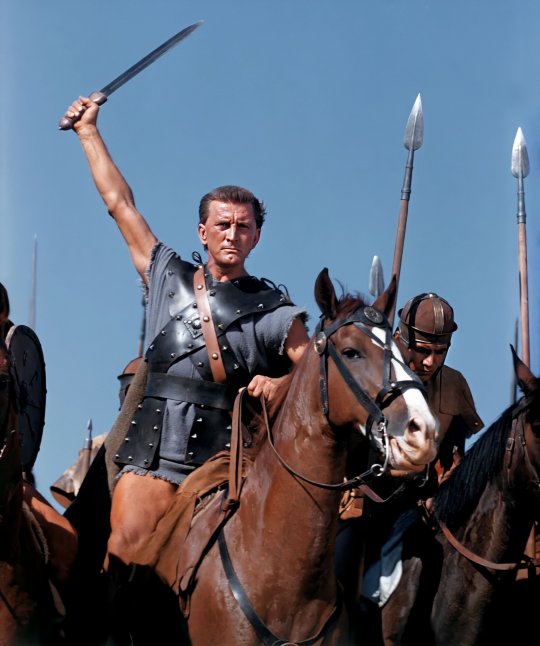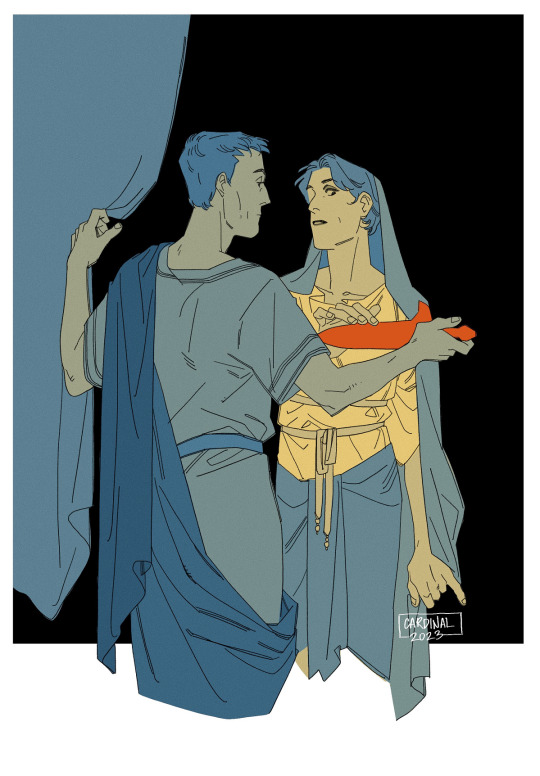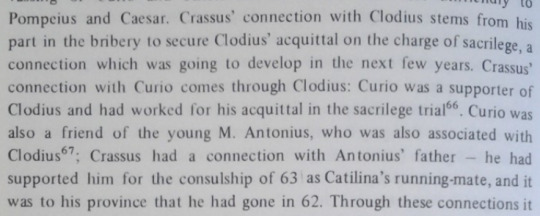#marcus licinius crassus
Text

Marcus Crassus explaining to the judges why he was so interested in a Vestal virgin.
31 notes
·
View notes
Text

Moreover, Caesar was not satisfied to be overlooked at first by Sulla, who was busy with a multitude of proscriptions, but he came before the people as candidate for the priesthood, although he was not yet much more than a stripling. To this candidacy Sulla secretly opposed himself, and took measures to make Caesar fail in it, and when he was deliberating about putting him to death and some said there was no reason for killing a mere boy like him
Plutarch, Caesar
sulla's fight with caesar is extremely funny, but also very Something considering how much of sulla you see reflected in caesar's later actions. breaking news: grown man picks fight with teenager, more at 11.
bsky ⭐ pixiv ⭐ pillowfort ⭐ cohost
#roman republic tag#drawing tag#komiks tag#ehgugh. okay.#hello late republic it has been. like. a week since you've appeared on my blog.#i had to dig through my other WIP folder which is just goofy comics i draw to amuse myself. which is what this is#the third guy is lucullus bc im still testing out designs. someday i will land on one i like.#my main WIP folder was just making me sad so we'll put that to the side for now and focus on making. coffee#i need to be awake before i attempt to try and read this one book and man i do not feel awake in the slightest#lucius cornelius sulla felix#lucius licinius lucullus#gnaeus pompeius magnus#marcus licinius crassus
462 notes
·
View notes
Text
If you were going to pin the BEGINNING of the downfall of the Roman Republic on the actions of one Roman
#roman history#ancient rome#roman empire#how often do you think about the roman empire#ancient history#julius caesar#pompey#caesar#pompeius magnus#the roman empire is my roman empire#gaius gracchus#gaius julius caesar#gaius marius#marian reforms#tiberius gracchus#the gracchi#sulla#lucius cornelius sulla#marcus licinius crassus#crassus#Pompey the great#i will cry over every vote for Pompeius
142 notes
·
View notes
Text
Inspired by @just-late-roman-republic-things' lists like this. XD I love them so much I had to try one.
The way ancient politicians escape a corn maze.
Octavian: He has scouted the route in advance and plotted a course. When he gets lost, he follows Agrippa out and takes the credit.
Agrippa: Literally the only one who finds his way out easily and on his own. He was never lost.
Mark Antony: He makes his way through somehow despite not planning a path. If he hits a dead end, he just pushes through the corn. At least once he hides in the corn and jump-scares Octavian to make him scream.
Lepidus: He entered the maze, but no one saw him exit. No one searches for him. Octavian says he made it home and Antony agrees. The fact they agree on this is concerning...
Cicero: He solves the layout immediately but then second guesses himself. As he walks, he audibly describes his thought process, pausing at every turn. Everyone behind him is in agony.
Dolabella: He sets the maze on fire after he finds out he still owes the entry fee and they won't waive it. He tries to blame Mark Antony.
Julius Caesar: He sends flunkies through to scout the maze for him and follows after they give him a map. He is dubbed the first to navigate the maze successfully.
Pompey: He gets lost on his own so he bribes someone to lead him out and after he exits, calls anyone else who had assistance to escape a cheater.
Crassus: He bought an aerial view of the maze beforehand and uses this to get out successfully. After Dolabella sets the maze on fire, he tries to sell the owner insurance.
Brutus: He navigates the maze successfully after he bands together with Cassius and essentially follows his friend out of the maze. Somehow he's the one who gets all the credit.
#ancient rome#ancient roman politicians#octavian#gaius julius caesar octavianus#mark antony#marcus antonius#lepidus#marcus agrippa#cicero#publius cornelius dolabella#gaius julius caesar#magnus pompey#marcus licinius crassus#marcus junius brutus#cassius#ancient history#the idea was from just-late-roman-republic-things#i just wanted to try#ancient memes
127 notes
·
View notes
Text
I will be posting about Roman history all day because it is the Ides of March and this is my right.
Caeser was interestingly not the worst of the first triumvirate, a girl band he was in with Pompey and Crassus. That honor, in my opinion, goes to Crassus.
Crassus is most well known for making one of the first Roman fire brigades. When there was an alarm of a house fire the brigade would rush to the scene. However, instead of putting out your fire, Crassus would try to buy your property, only putting the fire out when you sold it to him. And he would keep lowering the price as it burned.
20 notes
·
View notes
Text
Crassus' defence on the Vestal case was literally "I am home-sexual. As in, I am only into real estate".
80 notes
·
View notes
Text

35 notes
·
View notes
Text

and with your help, we can fix that
52 notes
·
View notes
Text

Spartacus (1960)
#1960#film#movie#Spartacus#Stanley Kubrick#Kirk Douglas#Peter Ustinov#Lentulus Batiatus#Laurence Olivier#Crassus#Marcus Licinius Crassus#Tony Curtis#Antoninus#Rome#Roman Republic#gladiator#gladius
27 notes
·
View notes
Text

#memes#politics#political memes#jeff bezos#amazon#marcus licinius crassus#roman empire#eat the rich#wealth inequality#capitalism#anti capitalism#anarchy#anarchist#anarchism
357 notes
·
View notes
Text

plut. cic. 25.2 trans. bernadotte perrin
marce tulli............
59 notes
·
View notes
Text
#queueing this to jumpscare myself two months from now#julius caesar#marcus licinius crassus#pompey#first triumvirate#polls#just roman memes#jlrrt speaks
132 notes
·
View notes
Text


revisiting crassus, clodius, and the bona dea scandal! but this time with a new composition and a limited color palette
originally when I drew the first version of this idea, it was back when I thought that crassus would be a week long fixation at most (lmao), and instead he just. took up permanent residence in my mind. it seemed like a fun thing to go back to an earlier idea and see what changed now that I've spent a lot more time with everyone involved in this era!
also the way these two interlocked politically. I am. biting into it.

The Defeat of Rome: Crassus, Carrhae and the Invasion of the East, Gareth C. Sampson

Crassus: the First Tycoon, Peter Stothard

Crassus: A Political Biography, B. A. Marshall


Crassus, Clodius, and Curio in the Year 59 B.C., Robert J Rowland, Jr.
bsky ⭐ pixiv ⭐ pillowfort ⭐ cohost
#for example. i even know who catulus and caelius are now. i did Not know who the fuck they were when i drew the original one#now im like. wow. those sure were some allegations. goddamn#i forgot that ive drawn crassus and clodius fucking before. i'll revisit that someday. ANYWAY. time for some organizational tags#marcus licinius crassus#publius clodius pulcher#roman republic tag#do i. have a tag for the bona dea scandal. i should#drawing tag#ALSO the first tycoon book. it's not a good reference point. i disagree with uhhh like a good third of it. BUT it is an EXTREMELY sexy#read. i would love an HBO show using this book as a point of inspiration. im not kidding. id watch it so fast#i was reading something that implied clodius role in the bona dea scandal was actually partially crassus' machinations#to undermine both caesar AND pompey. and once i finish digesting THAT thought. i will. draw a comic probably
470 notes
·
View notes
Text
they dream of legions
A short piece inspired by Crassus's Parthian campaign, the wars that are still fought in the desert two thousand years later, and the idea of armies haunting each other across history.
Everything outside the parentheses fits both generals and both armies.
----
He has never expected the desert to be so cold.
The ground is covered in frost in the morning, and spiders the size of dinner plates rush into their tents for warmth. Their bite isn’t lethal, but it hurts like hell, so the soldiers don’t sleep well. They complain of ghosts in the morning, of another army just like theirs, lost behind the dunes.
The sand and gets into the folds of their armor, their weapons are blunted by the sharp crystals, they eat sand with their dried rations and drink sand in their beer and have to shake it out of their hair every night despite the close-fitting helmets.
What, exactly, are they fighting for?
The pride of the empire, he tells his soldiers.
The hunger of the empire, devouring land after land.
It calls itself a republic still. He curses it and bleeds it dry and takes and takes and takes from it, riches and fame and power, and yet he loves it, he always has, he wouldn't blink before offering his life for it.
The republic has now demanded its sacrifice. It will open him up and read the future in his entrails, and his failure may not even make it to the histories that will be written about this war.
(His soldiers say, they dream of legions, dusty red cloaks and breastplates glimmering in the sunrise.)
(His soldiers say, they dream of legions, a line of heavy machines emerging from the sandstorm.)
They sleep during the day, it is too hot, but not for their enemies, who are vexing them, ceaselessly, picking them off one by one in hunting parties. How do you fight a war when an entire country has turned itself against you?
What will they consider a victory?
And how long will it last?
They’ll settle for another vassal state. And gold, he thinks. In any form. In the end, the spoils of war will let the citizens back home breathe just a little easier, he tells himself.
The desert is unforgiving, and he knows that he will be lucky if any soldiers of his will make it back. As for himself, he doesn't expect to.
(They meet their enemy in the field, and what was supposed to be an easy victory turns out to be a feint, a trick, so similar to those he had read about before, but somehow, it has escaped him this time.)
(They meet their enemy in the city, in a white haze of the dust, their best troops still coughing, half-blind, rushing into a wrong district, a trick of the enemy or his own mistake.)
He hopes it won’t cost too many lives, but it is shaping to be the deadliest battle since the last big war of the republic. A general is not supposed to make this kind of mistake.
Little awaits him at home, except for the political intrigues, the games of power, and wars and more wars stretching towards the horizon. They will keep him away from the government. He is safer over the sea. He is tired.
Before he falls, he tries to remember the name of this benighted place that will soon become his tomb.
(He thinks: Carrhae.)
(He thinks: Fallujah.)
#lemur writes#my fic#lemur romanus#marcus licinius crassus#carrhae#allusion to iraq war#war#roman republic#fallujah
18 notes
·
View notes
Text
Once again inspired by @just-late-roman-republic-things.
Unarmed Ancient Romans in a Haunted House
(It's a good things swords aren't allowed.)
Octavian: He wasn't feeling well when this was proposed but insists on coming, then screams at the jump scares and somehow ends up hiding in a field next door.
Agrippa: He heads through and has no reaction at all to the scares. On the way through he sees a door hanging off its hinges and pulls out his all purpose tool to fix it. If Octavian is still hiding in the field when he exits, he goes to find him.
Mark Antony: He is laughing at most of the scares and chatting with the scare workers. If one manages to startle him, they get punched in the face, but they all go out for beers afterwards so it's cool. (If he gets outside before Agrippa, he goes to get Octavian out of the field with a big sigh. He does tease him about this.)
Lepidus: He is a cautionary tale and becomes the subject of local legends as he reluctantly went into the haunted house after Antony and Octavian told him to, but he never leaves. Some say on late nights, you can hear a voice crying in the night, "Why did I think we were a trio?"
Cicero: He explains to his group the psychology and special effects behind the haunted house as they go through it. Yes, he shrieks at a jump scare, but then immediately says, "Ah, see, the startle scare activates one's sympathetic nervous system and triggers an acute stress response that prepares the body to engage in either fight or flight." His group might not enjoy this, but Cicero does.
Dolabella: He is one of the scare actors and absolutely takes it too far with his act. He is the one punched by Antony.
Julius Caesar: Let's be honest, he just bought tickets for his friends and supporters who wanted to go... But if pressed, would absolutely be the guy talking about how it was not going to be scary in line so the scare actors decide to gang up on him throughout the entire thing and make his experience miserable.
Pompey: He boasts even louder than Caesar about how he is unable to be scared. That leads to a gang of scare actors picking on him as well until he runs out screaming, but once outside he pretends he was laughing the entire time.
Crassus: He stays outside and partners scared looking people with a group of large, brave people working for him for a nominal fee. Haunted house escort service. Not THAT kind. (That costs extra.)
Brutus: He manages to get through the house, finding the attitudes of Julius Caesar and Magnus Pompey as horrifying as anything inside the house. (Except for the clowns. They are admittedly worse.)
#ancient memes#inspired by @just-late-roman-republic-things#I just had to make another seasonal one#ancient romans#ancient romans in situations#octavian#agrippa#mark antony#marcus antonius#lepidus#Cicero#publius cornelius dolabella#julius cassar#magnus pompey#marcus licinius crassus#marcus junius brutus#lepidus is always going to just disappear in these#Octavian's was inspired by his hiding in a marsh during the philipics#and antony did actually save his bacon a few times#although we all know agrippa was Octavian's main rescuer when he needed it#and yes eventually he was quite capable at battle it is just fun to tease#ancient roman memes
69 notes
·
View notes
Text
I'm stating this in relation to ancient Roman history but I'm sure it applies to any time and place where slavery was/is prevalent so if you're triggered by discussions of slavery and the R word (rhymes with grape) maybe just scroll on...
So the Roman view of slavery distilled down to its simplest is; an enslaved person has no agency.
So that view established it's an appalling truth that slaves both male and female have absolutely no control over access to their bodies. Rape happened a lot in the ancient world as a general rule: sieges, raids, war, no legal repercussions if you were a low status victim etc. but it will literally make you a little ill when you factor enslaved people into that picture. Combine the overwhelming misogyny and entitlement of the classes that owned the most slaves and the general over inflated sense of self the Romans possessed and you know it though you hate to think about but they raped their slaves a lot and thought nothing of it. And if they didn't personally they didn't really make a fuss if someone else did. It's gross but it's true.
Now to the point here that blows my mind HOW MANY SLAVES WERE THE SPITTING IMAGE OF THEIR MOTHER'S RAPIST? Like we know the children of slaves were born as slaves. So here are the female victims giving birth (yes there were abortives and contraceptives in the ancient world but how much access did enslaved women have to those things??) To children who will grow up in the house of their mother's abuser. Another generation of property for their owner. And how can the person who owns these people look them in the eye day after day watching them grow up knowing that that's their kid...
Like I know we can't judge the past by modern standards of morality especially the ancient past but to me it's just sort of morbidly fascinating like watching a train wreck. Like this was NOT an uncommon thing. It couldn't be. Not with how the system of slavery worked in ancient Rome. So like how many times is "so-and-so's freedman" who Plutarch or Tacitus is talking about really in fact their son, or brother, or cousin? Or even the unfreed people. Like how often was some nobleman being raised around his enslaved half-siblings? How often did a child by a slave get sold off and lost to history.
For all we know some people in Crassus' army could have been not very distant relations to some of the people in Spartacus' army.
The ancient world is smaller than you think and ten times as disturbing. It's all not just kinda possible but VERY possible and quite likely.
#ancient rome#roman history#roman empire#how often do you think about the roman empire#ancient history#marcus licinius crassus#crassus#spartacus#slavery#tw: slavery#tw: rape#the ancient world is a mess#slaves#enslaved peoples#slavery in ancient rome#rome#roman freedmen#freedmen
10 notes
·
View notes